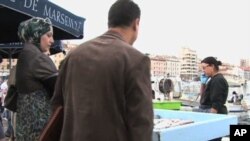France has one of the most diverse populations in Europe. But recently, tensions between different ethnic groups appear to have increased. Government moves to ban the full Muslim veil and to expel hundreds of Roma people, have reinforced the view that France is moving to the right. Marseilles, France's second biggest city and a major Mediterranean port, has a history of taking in people from around the world. But even here there is evidence of a backlash.
For many people in France's former African colonies, especially Morocco and Algeria, Marseilles was a gateway and the city's population is an ethnic mosaic. Some have even hailed Marseilles as a model of integration. An estimated 200,000 residents are Muslim, a quarter of the population.
But like the rest of France, anti-immigrant parties have seen a resurgence here. Analysts say government policies have fueled anti-immigrant feeling. In July, France became one of the first European countries to effectively ban the full veil worn by some Muslim women.
The move angered France's Muslim population, the biggest in Europe. At Marseille's largest mosque, Imam Haroun Derbal questions the reasoning behind the law.
"Muslims are very well integrated," said Derbal. "They've been here for centuries. Of course, Muslims are being stigmatized by this law. Why do it? For a total of 200 people in France who wear the full veil, you want to pass a law?"
In addition, a project to build a grand mosque in Marseilles has now stalled. "It's true to say that a part of the political opposition does not want this mosque," added Derbal. "When I say the far right, I'm talking about the National Front."
The National Front spearheaded the campaign against the mosque. In regional elections in March, the party increased its share of the vote to 20 percent with a campaign called "No to Islam." Stephane Ravier is a representative of the Front on Marseille's city council.
"There is integration in France, but the only integration is French people having to integrate themselves with foreigners," she noted. "In Marseille and all the big cities in France, the strongest feeling is that it is French people who are obliged to learn the culture and traditions of new groups who are arriving on their doorstep."
France's immigration debate also encompasses the Roma people, known as Gypsies. In August, the government approved the expulsion of hundreds of Romas to Romania and Bulgaria, sparking outrage from human rights groups and even the European Union. President Nicolas Sarkozy has defended the round-up as a crackdown on crime. He denies targeting a particular ethnic group.
Thierry Noir, a political correspondent with the regional newspaper La Provence, says the debate over immigration has economic roots.
"For the last 30 years France has functioned on a model of integration, but it's a model that is dependent on economic growth," said Noir.
As in many European countries, France's debate over immigration has become louder in the economic downturn. In a period of uncertainty, France is debating not only its policies, but its identity.














